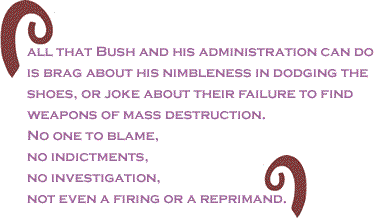
|
|||||||||||||||||||||||

|
|

Custom Search
|
|
 |
|
Jailed Iraqi journalist Muntadhar al-Zeidi has thrust himself into history and become an international overnight celebrity. Thousands protest for his release. A Saudi businessman offers $10 million for one of his shoes. Libya nominates him for a medal. Why? Because al-Zaidi threw his shoes at President Bush, capturing a moment for which millions have yearned. “This is your farewell kiss, you dog!” Al-Zeidi shouted at Bush. “This is from the widows, the orphans, and those who were killed in Iraq.” Apparently, the significance of the act—considered a supreme insult in Arab culture—was lost on Bush, who called it “amusing” and a “bizarre moment.” For Bush, Al-Zeidi’s gesture is a very small price to pay for waging one of the biggest blunders in American history - the Iraq war. No one has been held accountable for the hundreds of thousands of needless deaths, the destruction of a country and its culture, the blood of over 4,200 U.S. soldiers and tens of thousands wounded and maimed. Meanwhile, all that Bush and his administration can do is brag about his nimbleness in dodging the shoes, or joke about their failure to find weapons of mass destruction. No one to blame, no indictments, no investigation, not even a firing or a reprimand. So, not unlike his dismissal of the shoe-throwing incident, Bush seems to shrug his shoulders over the legacy of carnage he has left in Iraq. In a confluence of historical forces, Al-Zeidi has captured the moment. But he does not stand alone. Al-Zeidi is but the latest in a line of people who were placed in the spotlight because of the inaction of the powerful, because the intelligentsia and the media decided to take a pass when injustice was present, and accept things as they were. Rosa Parks was thrust into the center of the civil rights struggle after years of a nation accepting Jim Crow as an alternative to Reconstruction. Segregation was the law of the land, wholeheartedly endorsed by the Ivy league-educated Supreme Court in Plessy v. Ferguson. Despite the fact that “separate but equal” was impossible in a system that depended on the suppression of the rights of African Americans, the media accepted the proposition and perpetuated a lie for years. Similarly, the public outrage over the brutal beating of Rodney King came after years of police brutality as standard practice in poor communities and communities of color. Many had accepted police brutality as a buffer against Negro uprising, a way to keep Black people in line and maintain order. The mainstream media did its part by refusing to report on incidents of police brutality, or reporting such stories in a way which characterized Black victims as criminals and the offending police officers as heroes. And the court system had failed to correct these injustices due to patronage and political influence, corruption, and the acceptance of the status quo as a means of advancing in the system. Back to the matter at hand regarding Iraq: Bush bamboozled the media through his push for war in Iraq, his manufacturing of a reason for war, and his constant changing of the rationale for war. One day the rationale was a link between Saddam Hussein, al Qaeda and 9-11. Another day it was weapons of mass destruction and the threat Saddam posed to America, and still another day the rationale for going to war was bringing democracy to the Mideast. Iraq has been far too chaotic to form voices in opposition.
Meanwhile, the intelligentsia in the U.S. was mostly silent and acquiescent during the Bush years due to their desire for personal financial comfort. And the corporate media were too entangled with the people in power, and in some cases too entangled financially in the machinery of war, to serve a proper watchdog role. The war, and the massive loss of lives it created, was valued for its television entertainment value, and opposition to the war was regarded as unpatriotic. Meanwhile, Al-Zeidi, who was a victim of a kidnapping by unknown assailants in November 2007, and was arrested twice by the U.S. military, knows and lives the occupation. His reports on the death and destruction of the war in Iraq— including the story of Zahra, a young Iraqi girl killed by the occupation forces on her way to school—have earned him the respect of the people. Muntadhar al-Zeidi is Rodney King, and he is Lech Walesa. And he is Rosa Parks and the anonymous protestor who stopped the tank in Tiananmen Square. A journalist who stands up for the widows, the orphans, and the children of the Iraq War, this ordinary man is doing extraordinary things that the power elite and lame stream media ignored. He sees through the deception of the war, and the disastrous consequences for the country he loves. BlackCommentator.com Guest Commentator Angus R. Love is the Executive Director of the Pennsylvania Institutional Law Project, a non-profit organization which seeks to deliver civil legal services to the institutional population of Pennsylvania, and ensure equal justice for low income residents of prisons, jails, and state hospitals and state centers. Angus has been a longtime advocate for improved prison conditions in the state. BlackCommentator.com Editorial Board member David A. Love, JD is a journalist and human rights advocate based in Philadelphia. Angus and David are not related, to their knowledge. Click here to contact Messrs Love. |
|
Any BlackCommentator.com article may be re-printed so long as it is re-printed in its entirety and full credit given to the author and www.BlackCommentator.com. If the re-print is on the Internet we additionally request a link back to the original piece on our Website. Your comments are always welcome. eMail re-print notice
If you send us an eMail message we may publish all or part of it, unless you tell us it is not for publication. You may also request that we withhold your name. Thank you very much for your readership. |
|
| |
|
| January
8, 2009 Issue 306 |
|
| Executive Editor: Bill Fletcher, Jr. |
| Managing Editor: Nancy Littlefield |
| Publisher: Peter Gamble |
| Est. April 5, 2002 |
Printer Friendly Version
in resizeable plain
text format or pdf
format. |
| Frequently Asked Questions |
 |

|
 |
 |
 |
| |
| |





































